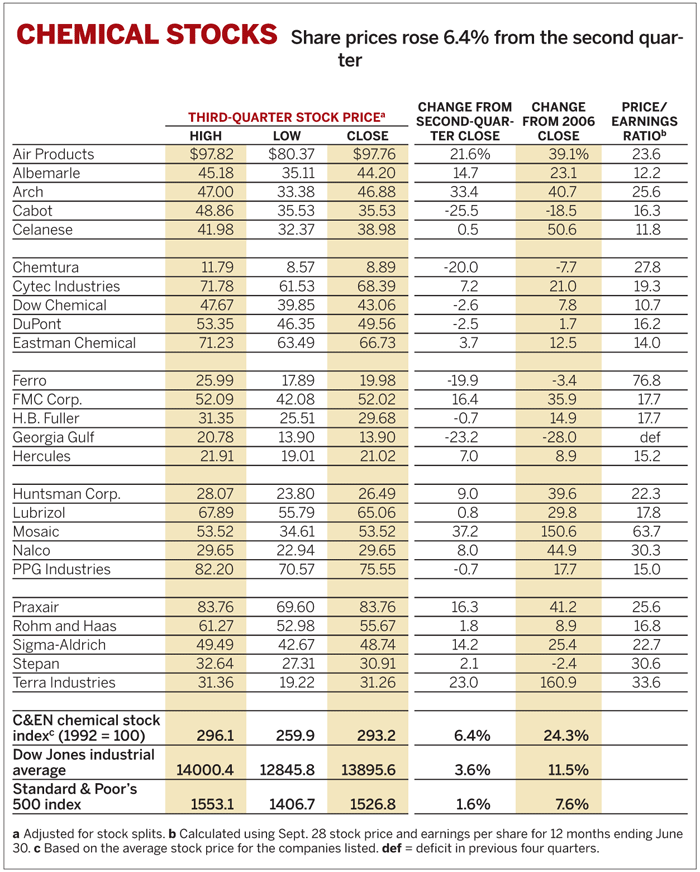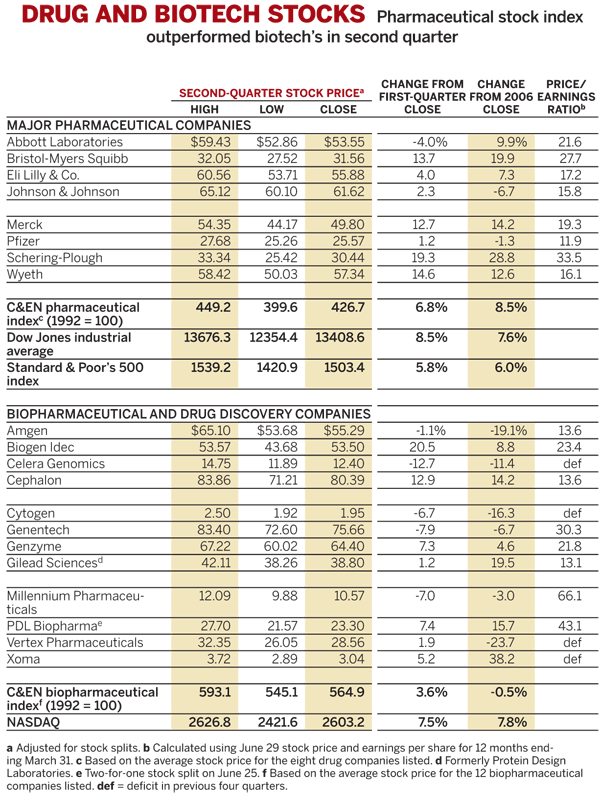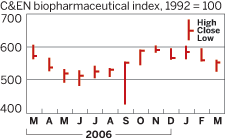Advertisement
Grab your lab coat. Let's get started
Welcome!
Welcome!
Create an account below to get 6 C&EN articles per month, receive newsletters and more - all free.
It seems this is your first time logging in online. Please enter the following information to continue.
As an ACS member you automatically get access to this site. All we need is few more details to create your reading experience.
Not you? Sign in with a different account.
Not you? Sign in with a different account.
ERROR 1
ERROR 1
ERROR 2
ERROR 2
ERROR 2
ERROR 2
ERROR 2
Password and Confirm password must match.
If you have an ACS member number, please enter it here so we can link this account to your membership. (optional)
ERROR 2
ACS values your privacy. By submitting your information, you are gaining access to C&EN and subscribing to our weekly newsletter. We use the information you provide to make your reading experience better, and we will never sell your data to third party members.
Business
Stock Indexes Mixed
Chemicals and biotech improve in fourth quarter, but pharmaceuticals decline slightly
by William J. Storck
January 16, 2006
| A version of this story appeared in
Volume 84, Issue 3
Results were mixed in the fourth quarter among C&EN's three industry stock indexes. Chemical stocks rose from the previous three-month period, while share prices at pharmaceutical companies declined slightly. On the other hand, stock prices at biotech firms, on average, showed very good growth.
C&EN's index of 25 chemical company stocks recovered in the fourth quarter from a decline in the third quarter, when markets were affected by hurricanes and the attendant spike in energy and raw material costs, plus lower consumer confidence. The C&EN index in the fourth quarter rose 5.2% from the end of September to 196.0 (all C&EN indexes are based on 1992 = 100). This follows a 3.4% quarter-to-quarter decline in the July-through-September period.
And the chemical stock index beat the Dow Jones industrial average, which rose just 1.4% in the fourth quarter to 10717.5. However, the Dow Jones had not experienced the third-quarter decline, rising 2.9% in that period.
For the full year, the C&EN chemical index on the last trading day of 2005 was down 4.6% from the end of 2004. The Dow Jones, meanwhile, fell just 0.6% from the end of the prior year.
The C&EN index for nine big pharmaceutical companies finished the year down 1.1% from the end of the third quarter and off 2.2% from the last trading day of 2004. The biotech average was up 7.3% quarter-to-quarter and 21.3% from the end of 2004.
The chemical index hit its quarterly high of 198.9 on Dec. 1, while the highs both for the drug index of 354.4 and for the biotech index of 581.7 came on Dec. 23. The low for the chemical index of 178.9 was seen on Oct. 12, while the drug index bottomed out at 330.1 on Nov. 30, and the low for the biotech index of 500.4 came on Oct. 12.
Among the 25 chemical stocks that make up the C&EN index, just seven were down from the end of the previous quarter, while in the disaster-fraught third quarter, 17 of the 25 chemical companies saw their stock prices fall. For the full year, 16 company stocks were down from where they had been at the end of 2004.
Only two chemical companies had double-digit stock price declines in the fourth quarter: Huntsman Corp. and Terra Industries. These two firms depend heavily on oil and natural gas feedstocks. Huntsman stock declined 11.9% for the quarter to $17.22 per share; Terra's stock price fell 15.8% to $5.60 per share.
These two firms, along with Georgia Gulf, led the declines for the full year. Terra's stock was down 36.9%; Huntsman was off 29.7% from Feb. 14, when its stock began trading; and Georgia Gulf was down 38.9% to $30.42 per share.
Eight other chemical companies had double-digit drops for the full year, including industry leader Dow Chemical, which saw its share price fall 11.5% to $43.82, and number two DuPont, which fell 13.4% to $42.50 per share.
Both Dow and DuPont, however, finished the year higher than they had been at the end of the third quarter. Dow's stock price was up 5.2% in the quarter; DuPont's rose 8.5%.
Among the nine drug companies that make up C&EN's pharmaceutical index, seven had declines by the end of the fourth quarter from the end of September. The two that showed price improvement were Eli Lilly & Co., up 5.7% to $56.59 per share, and Merck, which seems to be recovering somewhat after two favorable court rulings regarding its COX-2 drug Vioxx. It saw an increase in its stock price of 16.9% to $31.81 per share.
Pfizer, the largest of these firms, saw its stock drop 6.6% to $23.32 per share. Abbott Laboratories had the largest decline, 7.0% to $39.43 per share.
Johnson & Johnson, which has made a $21.5 billion offer to acquire Guidant, a maker of cardiovascular appliances, saw its stock drop 5.0% to $60.10 per share. Baxter International was down 5.6% to $37.65 per share, while Bristol-Myers Squibb fell 4.5% to $22.98 per share.
For the full year, Baxter bested the other eight companies in stock price appreciation, up 9.2%. It was followed closely by Wyeth, up 8.9% to $46.07 per share. On the downside, Abbott was again the biggest loser, with its stock price falling 14.7%. It was followed by Pfizer, down 12.8%, and Bristol-Myers Squibb, down 9.7%.
Of the 15 companies that make up C&EN's biotechnology index, nine saw their stock prices increase in the quarter, five had declines, and one (Icos) was unchanged from the end of the third quarter.
Cephalon, which beat analysts' earnings expectations in the fourth quarter and provided rosy earnings guidance for 2006, saw its stock rise 39.5% to $64.74 per share, the largest increase in the group. Vertex Pharmaceuticals, another company providing positive guidance, although with a negative bottom line, followed with a 23.8% stock price increase to $27.67 per share.
Amgen, the largest biopharmaceutical firm, saw its stock decline 1.0% in the quarter to $78.86 per share; but for the full year, its stock increased by 23.2%. It was beaten by Genentech, the number two firm on the list, which had a 9.8% increase in the quarter to $92.50 per share and a yearly increase of 69.1%.
The highly volatile Cytogen saw the largest percentage decline. Its stock was down 32.2% for the quarter and 75.6% for the year to $2.74 per share.
Investors are undoubtedly wishing that all of 2006 would follow what happened in the year's first four trading days. In the first week of the new year, all of the major indexes, as well as the three C&EN indexes, improved. From Dec. 30 through Jan. 6, the Dow Jones rose 2.3% and NASDAQ rose 4.6%.
For the same period, C&EN's pharmaceutical index increased 3.1% to 358.1, and the biotech index improved 3.3% to 586.3.
The chemical index was the big gainer, though, rising 3.6% to 203.1. But the gain was highly influenced by BASF's $37.00-per-share hostile takeover bid for Engelhard. Engelhard's stock rose 27.4% to $38.42 per share between the end of December and the end of the first week in January. Without Engelhard, the chemical company index would still have been up, but by just 2.8%.
MORE ON THIS STORY
Stock Indexes Mixed
Chemicals and biotech improve in fourth quarter, but pharmaceuticals decline slightly
TABLE 1 - CHEMICAL STOCKS
Some chemical stock prices suffer big declines







Join the conversation
Contact the reporter
Submit a Letter to the Editor for publication
Engage with us on Twitter